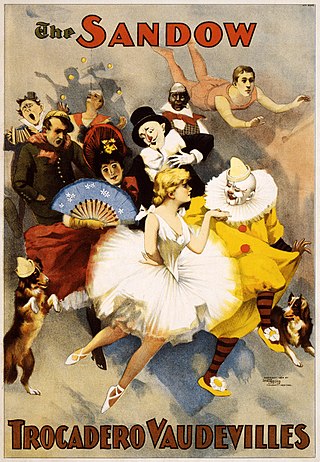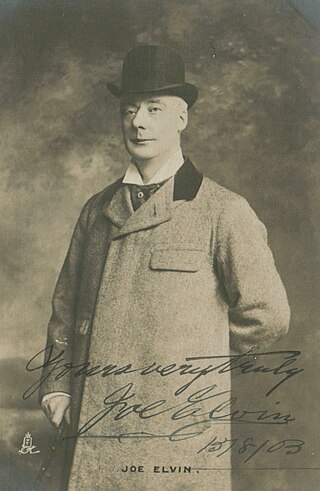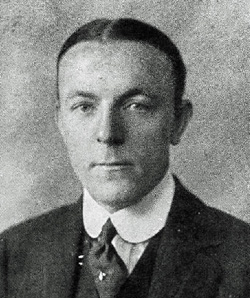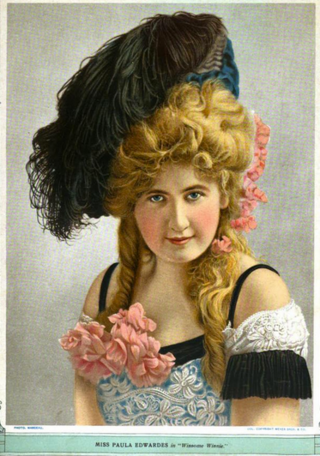Related Research Articles

Vaudeville is a theatrical genre of variety entertainment born in France at the end of the 19th century. A vaudeville was originally a comedy without psychological or moral intentions, based on a comical situation: a dramatic composition or light poetry, interspersed with songs or ballets. It became popular in the United States and Canada from the early 1880s until the early 1930s, but the idea of vaudeville's theatre changed radically from its French antecedent.

The Actors' Equity Association (AEA), commonly referred to as Actors' Equity or simply Equity, is an American labor union representing those who work in live theatrical performance. Performers appearing in live stage productions without a book or through-storyline may be represented by the American Guild of Variety Artists (AGVA). The AEA works to negotiate and provide performers and stage managers quality living conditions, livable wages, and benefits. A theater or production that is not produced and performed by personnel who are members of the AEA may be known as "non-Equity".

Equity, formerly officially titled the British Actors' Equity Association, is the trade union for the performing arts and entertainment industries.

Stage management is a broad field that is generally defined as the practice of organization and coordination of an event or theatrical production. Stage management may encompass a variety of activities including the overseeing of the rehearsal process and coordinating communications among various production teams and personnel. Stage management requires a general understanding of all aspects of production and provides complete organization to ensure the process runs smoothly and efficiently.

Music hall is a type of British theatrical entertainment that was popular from the early Victorian era, beginning around 1850. It faded away after 1918 as the halls rebranded their entertainment as variety. Perceptions of a distinction in Britain between bold and scandalous Music Hall and subsequent, more respectable Variety differ. Music hall involved a mixture of popular songs, comedy, speciality acts, and variety entertainment. The term is derived from a type of theatre or venue in which such entertainment took place. In North America vaudeville was in some ways analogous to British music hall, featuring rousing songs and comic acts.

Broadway theatre, or Broadway, are the theatrical performances presented in the 41 professional theatres, each with 500 or more seats, located in the Theater District and the Lincoln Center along Broadway, in Midtown Manhattan, New York City. Broadway and London's West End together represent the highest commercial level of live theater in the English-speaking world.

The Media, Entertainment & Arts Alliance (MEAA), also sometimes referred to as the Alliance, is the Australian trade union and professional organisation which covers the media, entertainment, sports and arts industries.

Amateur theatre, also known as amateur dramatics, is theatre performed by amateur actors and singers. Amateur theatre groups may stage plays, revues, musicals, light opera, pantomime or variety shows, and do so for the social activity as well as for aesthetic values. Productions may take place in venues ranging from the open air, community centres, or schools to independent or major professional theatres.
Weston's Music Hall was a music hall and theatre that opened on 16 November 1857 at 242-245 High Holborn in London, England. In 1906, the theatre became known as the Holborn Empire.
Andrew Van Buren is a British multi skilled performer, illusionist, plate spinner and showman who specialises in presenting large-scale illusions, plate spinning routines, magic, juggling and circus style skills in all type of performance venues.
The Joseph Jefferson Award, more commonly known informally as the Jeff Award, is given for theatre arts produced in the Chicago area. Founded in 1968, the awards are named in tribute to actor Joseph Jefferson, a 19th-century American theater star who, as a child, was a player in Chicago's first theater company. Two types of awards are given: "Equity" for work done under an Actors' Equity Association contract, and "Non-Equity" for non-union work. Award recipients are determined by a secret ballot.
The 2003 Broadway musicians strike was a strike by the Associated Musicians of Greater New York, American Federation of Musicians Local 802 union members, and other Broadway unions such as Actors' Equity Association and International Alliance of Theatrical Stage Employees. The strike lasted from Friday, March 7, 2003 to early Tuesday morning, March 11, 2003.

Joe Elvin was an English comedian and music hall entertainer and a Founder of the Grand Order of Water Rats, a show business charity. With other leading performers he took part in the Music Hall War of 1907, which supported less well paid music hall artistes in their strike for better pay and conditions.

An actor or actress is a person who portrays a character in a performance. The actor performs "in the flesh" in the traditional medium of the theatre or in modern media such as film, radio, and television. The analogous Greek term is ὑποκριτής (hupokritḗs), literally "one who answers". The actor's interpretation of a role—the art of acting—pertains to the role played, whether based on a real person or fictional character. This can also be considered an "actor's role," which was called this due to scrolls being used in the theaters. Interpretation occurs even when the actor is "playing themselves", as in some forms of experimental performance art.

The Music Hall Strike of 1907 was a theatrical dispute which took place between music hall employees, stage artistes and London theatre proprietors. The catalyst for the strikes were the employees' lack of pay, the scrapping of perks, and an increase in working hours, and matinée performances.

George Windsor Graves was an English comic actor. Although he could neither sing nor dance, he became a leading comedian in musical comedies, adapting the French and Viennese opéra-bouffe style of light comic relief into a broader comedy popular with English audiences of the period. His comic portrayals did much to ensure the West End success of Véronique (1904) The Little Michus, and The Merry Widow (1907).

The 1919 Actors' Equity Association strike officially spanned from August 7, 1919, to September 6, 1919. In the late 19th and early 20th centuries, the theatre industry was revolutionized by powerful management groups that monopolized and centralized the industry. These groups created harsh working conditions for the actors. On May 26, 1913, actors decided to unionize, and they formed the Actors' Equity Association. After many failed attempts to negotiate with the producers and managers for fair treatment and a standard contract, Equity declared a strike against the Producing Managers' Association on August 7, 1919. During the strike, the actors walked out of theaters, held parades in the streets, and performed benefit shows. Equity received support from the theatrical community, the public, and the American Federation of Labor, and on September 6, 1919, the actors won the strike. The producers signed a contract with the AEA that contained nearly all of Equity's demands. The strike was important because it expanded the definition of labor and altered perceptions about what types of careers could organize. The strike also encouraged other groups within the theatre industry to organize.

Paula A. Edwardes was an American stage performer in musical comedies and vaudeville.
The Actors' Fidelity League (Fidelity) was a short-lived unaffiliated American craft union representing actors who worked in live theatrical performances. It split off from Actors' Equity Association (Equity) in August 1919 when the parent organization affiliated with the American Federation of Labor (AFL) and adopted strike tactics. Fidelity approved of collective bargaining but objected to breaking contracts once signed. A few of its members objected to trade unionism itself in the belief that they were artists rather than craftsmen. Though not a company union in the traditional sense, there was some merit in Equity accusations that the League was too close to the producers.
William Herbert Cartmel, known as W. H. Clemart, was an English ventriloquist and an organiser of variety performers in the Variety Artistes' Federation and the Grand Order of Water Rats.
References
- 1 2 3 Roger Wilmut, Kindly Leave the Stage: The Story of Variety 1919-1960, Methuen, 1985, ISBN 0-413-48960-4, p.49
- 1 2 Marsh, Arthur; Ryan, Victoria (1980). Historical Directory of Trade Unions. Vol. 1. Farnborough: Gower. p. 224. ISBN 0566021609.
- ↑ Richard Anthony Baker, Old Time Variety: an illustrated history, Pen & Sword, 2011, ISBN 978-1-78340-066-9, p.38